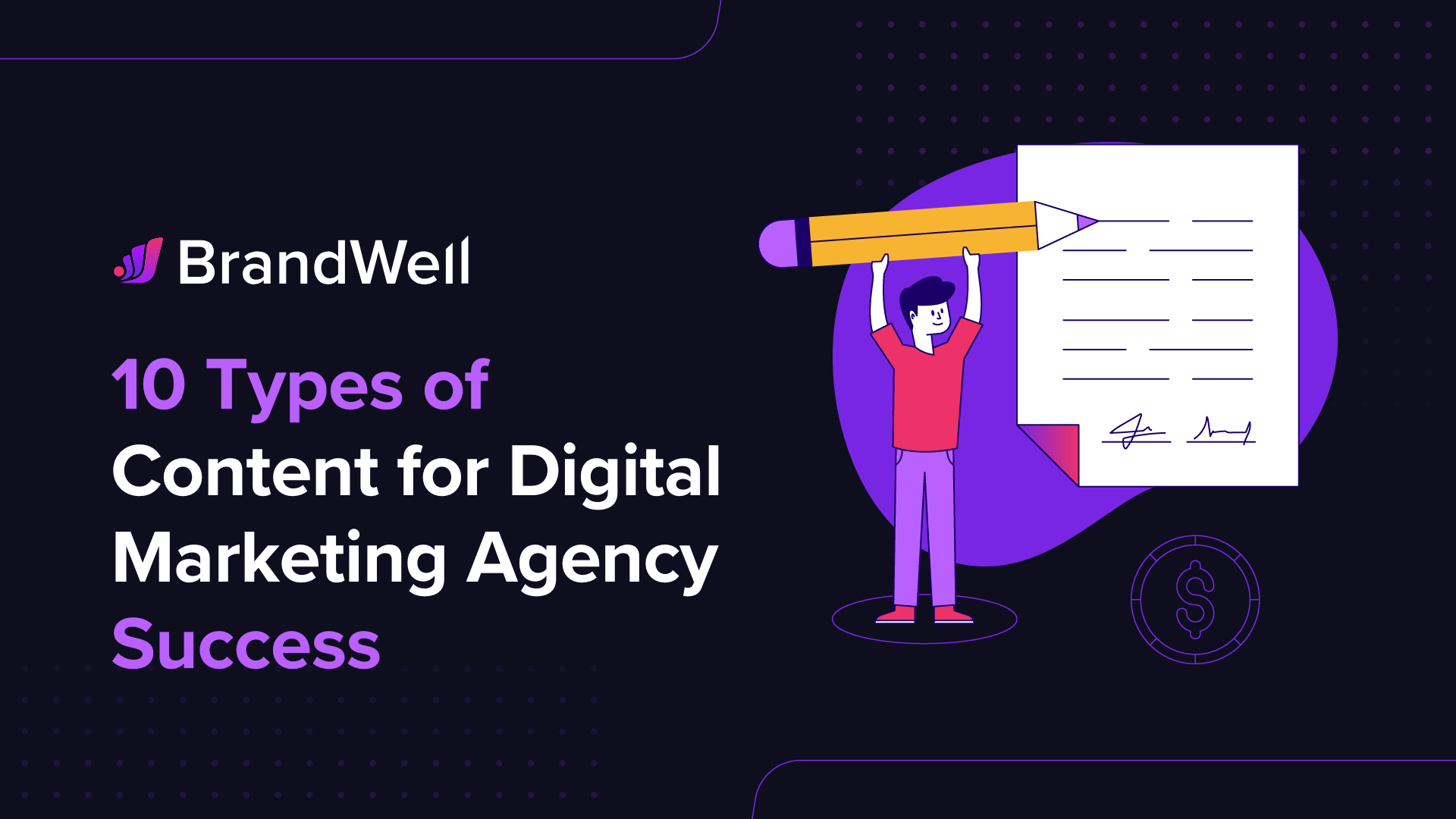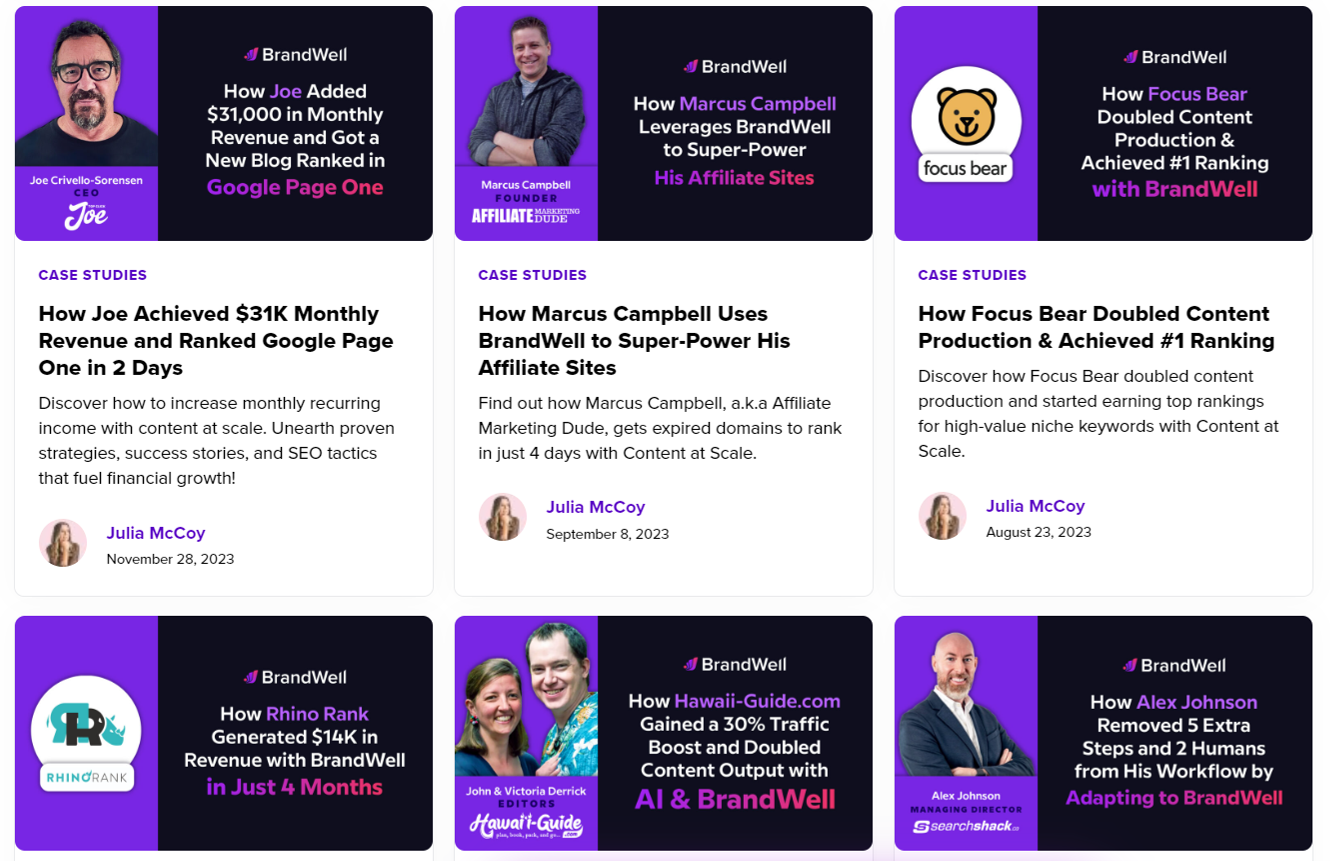Digital marketing agencies are always on the lookout for fresh, engaging content that drives traffic, sparks conversations, and generates leads.
Sure, blogs and social media posts are great, but if you want to stand out in today’s fast-paced digital world, you need interactive and high-value content that keeps your audience hooked.
So, what type of content should you be focusing on in 2025?
Table Of Contents:
- Know Your Audience: Who Are You Writing For?
- Types of Content for Digital Marketing Agency Campaigns
- The Importance of Regularly Updated, Quality Content
- 4 Things Every Digital Marketing Agency Needs
- FAQs: Content for Digital Marketing Agency
- Conclusion
Know Your Audience: Who Are You Writing For?
The first step in choosing the right content type is knowing who you are writing for. The better you understand your audience, the better equipped you are to provide them with content that’s valuable, interesting, and share-worthy.
Define Your Ideal Client
Begin by outlining your ideal client profile. What are their demographics, interests, pain points, and online behaviors?
Tools like Google Analytics, social media analytics, and market research platforms can help you uncover this information.
By understanding your audience’s challenges, aspirations, and preferred channels of communication, you can tailor your content to their specific needs and improve your chances of conversion.
Create Buyer Personas
After defining your ideal client, start creating detailed buyer personas. These are semi-fictional representations of your ideal clients. Having a clear image of who you are trying to reach makes the rest of the content creation process smoother and more effective.
Identify Relevant Keywords
Now that you know who you are writing for and what interests or pains them, how do you start writing content that meets their needs?
The answer is keyword research.
Identify the keywords and phrases they often use when searching online. They are most likely searching for information or solutions related to your services.
Keyword research tools like Google Keyword Planner and Ahrefs are essential resources that provide information on search volume and keyword difficulty — helping you fine-tune your keyword strategy.
Types of Content for Digital Marketing Agency Campaigns
The next step is deciding which type of content will resonate best with your audience. Consider using a variety of these content types and see which ones get the best results:
1. Blog Posts
Blogs are still a highly effective way to establish thought leadership and improve your search engine ranking.
Blog posts allow you to share your industry knowledge, insights, and expertise with your target audience. This will attract potential clients looking for valuable information and drive traffic to your website.
BrandWell’s long-form content writer, RankWell, makes it easy for you to publish long-form blog posts at scale.
Instead of posting one article a week for each client, you can ramp up your content marketing efforts and publish 25x more content!
Just enter a keyword and in less than 5 minutes you’ll get an article that looks like this:
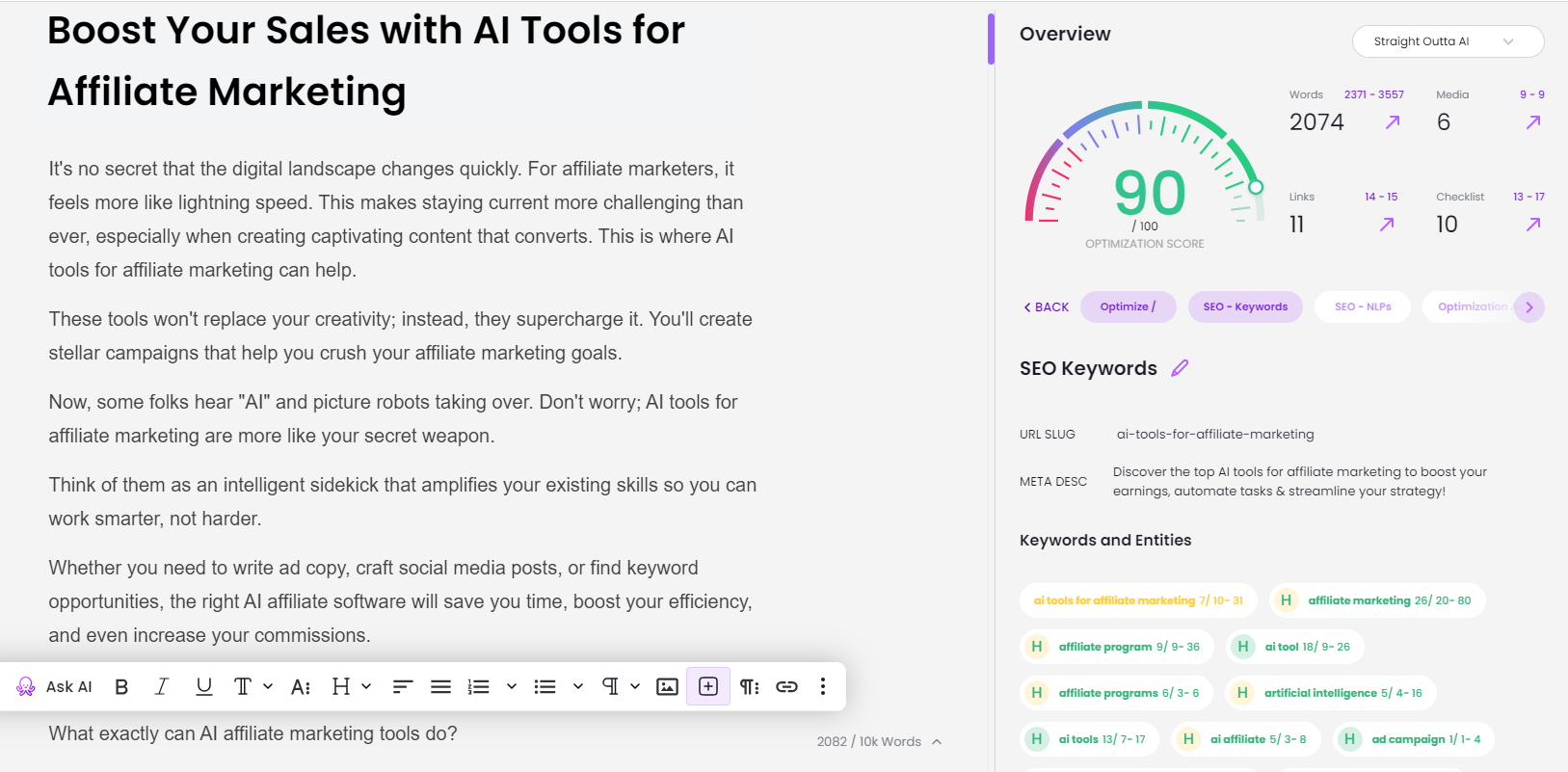
RankWell also has a built-in keyword tool so you don’t have to pay for another subscription if you want to find topics to write about.
On the keyword report, you’ll see the two most important metrics when doing keyword research: search volume and ranking difficulty.
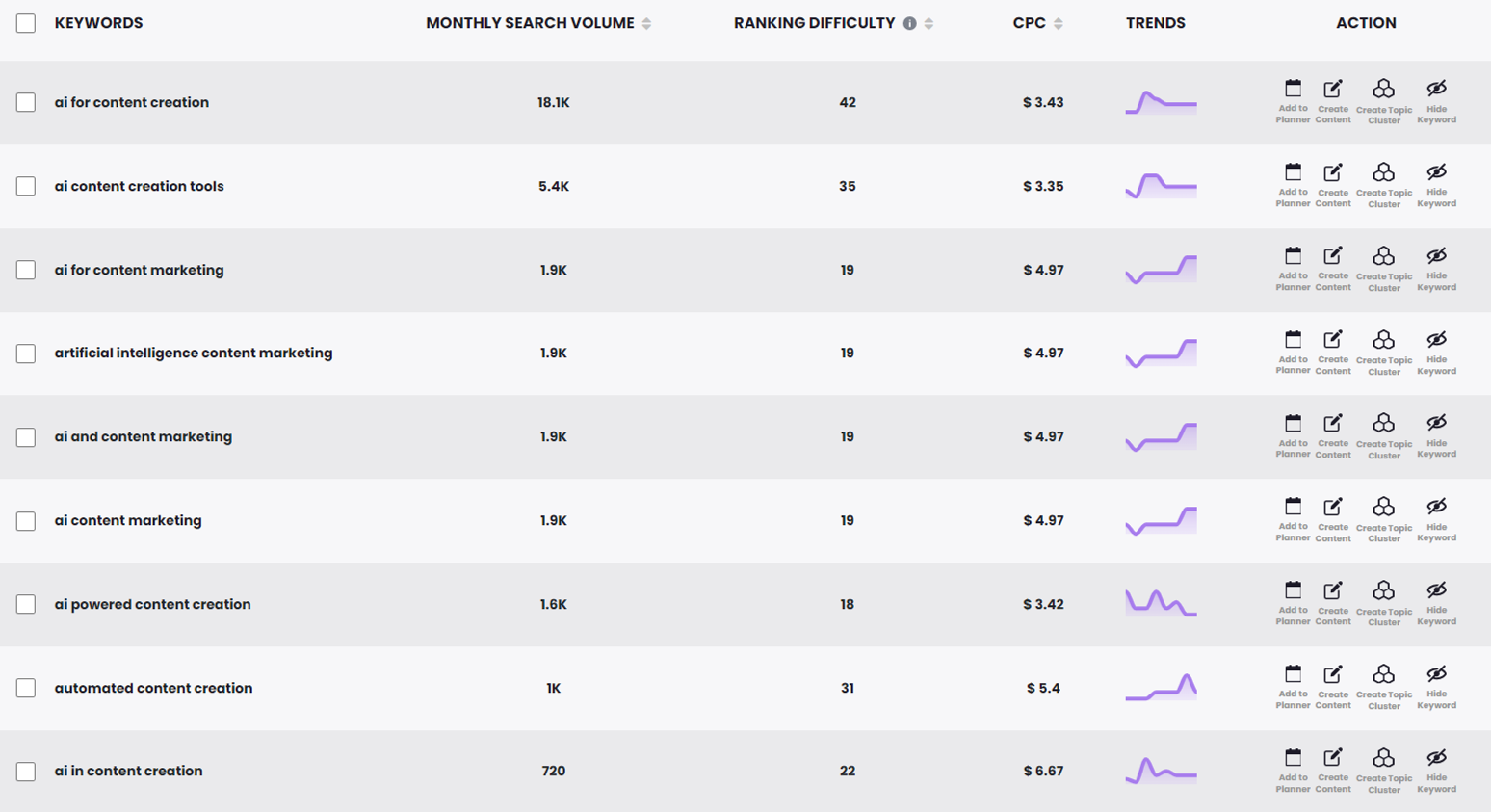
Got a lot of content to write? Watch how easy it is to bulk upload your keywords and create hundreds of posts with BrandWell:
While the RankWell output is good enough to publish — it reads well, it covers the topic in-depth, and it’s optimized with keywords — it might be lacking E-E-A-T which is the key to getting Google to notice your content.
Be sure to personalize your blog post before going live.
Click here for a complete guide on how to humanize AI content — a necessary step if you want your readers (and Google) to love your piece.
2. Infographics
Infographics are a visually appealing and shareable content format that simplifies complex data. They allow the user to digest content easily even when the topic is too technical.
A well-designed infographic also has the potential to go viral, boosting brand awareness. When shared on social media platforms or other websites, infographics can help increase brand authority and position your agency as an authoritative source.
For example: a marketing agency could create an infographic on SEO ranking factors or the latest SEO statistics of 2025 to get high engagement and backlinks from industry blogs.
Although you can create infographics on your own with tools like Canva or Piktochart, it is best to hire a professional designer to handle all the visual materials of your digital agency.

Image source: Venngage
3. Customer Testimonials and Case Studies
Nothing convinces potential clients like real success stories. Testimonials and case studies prove your expertise and build credibility.
These are especially effective for B2B digital marketing agencies as businesses seek evidence of your capabilities.
How do you showcase your services?
- Showcase Real Results: Use hard data and metrics.
- Tell a Story: Show the client’s challenge, your solution, and the results.
- Use Multiple Formats: You can publish your case studies in written, video, or social media snippet format.
For example: a Facebook Ads agency could publish “How We Helped [Client Name] Increase Leads by 300% in 90 Days.”
Check out these BrandWell case studies:
4. Videos
More and more people are turning to video platforms such as YouTube because this is the fastest and most straightforward way to get information.
A recent study by OptinMonster showed that watching a video convinced 89% of consumers to buy a product or service while 79% bought an app or software. No wonder 92% of marketers say video gives them a good return on their investment.
How to create effective videos for your clients:
- Educate & Entertain: Consider adding live streams, Q&A sessions, behind-the-scenes glimpses, or explainer videos to your content marketing campaigns.
- Keep It Short & Engaging: 30-90 seconds for social media, 5-10 minutes for YouTube.
- Use Captions: Many viewers watch videos without sound which makes captions a standard feature nowadays.
If you’re a branding agency, you could create a video on “5 Easy Hacks to Make Your Brand Stand Out on Instagram.”
5. Podcasts
Podcasts have emerged as an engaging medium, catering to audiences on the go. Sharing interviews with experts and thought leadership in the business-to-business (B2B) marketing world can go a long way.
Publishing podcasts across multiple platforms such as Spotify, Apple Podcasts, Google Podcasts, and others makes it easier for listeners to find your content. It also builds brand recognition and boosts SEO.
Listeners can tune in to your content while commuting, working out, or doing daily tasks, making podcasts extremely convenient and effective.
For example: a content marketing agency could launch “The Growth Hacker Podcast: Scaling Businesses with Smart Marketing.”
6. E-books & Guides
E-books and guides that offer practical value to your audience work as lead magnets to collect valuable contact information and nurture leads.
Content that addresses their needs and challenges positions your digital marketing agency as an invaluable resource while creating opportunities to showcase your expertise.
When creating ebooks and guides:
- Choose a deep-dive topic like “The Ultimate Guide to LinkedIn Ads.”
- Break up heavy text into digestible sections by using visuals and bullet points.
- Require an email signup for access.
- Always include a call to action to guide them toward becoming clients.
Want to learn how to create an e-book in 25 minutes? Watch this video:
7. Quizzes and Polls
People love quizzes. Whether it’s discovering their ideal mate or taking a fun personality test, interactive content like quizzes and polls keeps users engaged, increases time on site, and gives you valuable audience insights. Plus, they’re super shareable!
A few tips on how to create quizzes and polls:
- Pick a Hot Topic: Think about what your audience is struggling with or curious about.
- Use Interactive Tools: Platforms like Typeform, Outgrow, or Polls on Instagram and LinkedIn make it easy to add quizzes and polls to your content.
- Make It Fun & Shareable: Let users share their results on social media to expand your reach.
- Use Responses for Targeting: The answers can help segment your audience and refine your messaging.
For example: a marketing agency could run a LinkedIn poll asking, “What’s your biggest digital marketing challenge?” with multiple choice answers like:
- Generating leads
- SEO rankings
- Paid ads ROI
- Social media engagement
The results? Instant insights on what content your audience cares about.
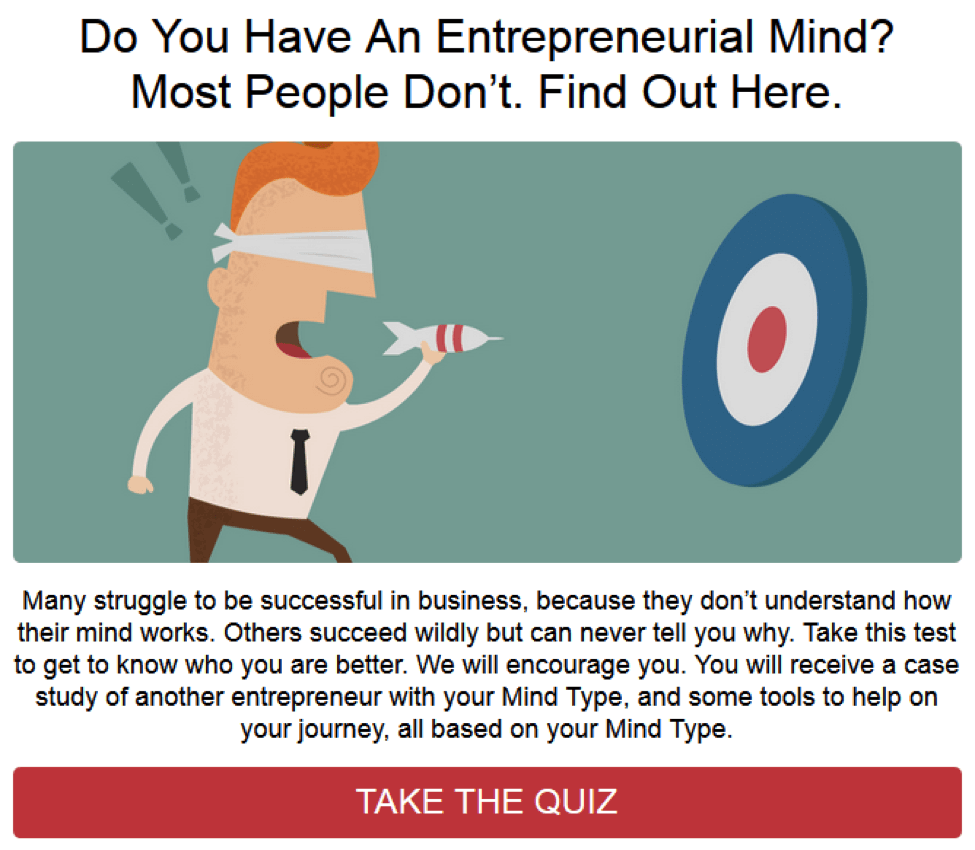
This quiz generated leads and increased revenue for The Foundation. Image source: Outbrain
8. Guest Posts
Guest blogging allows you to tap into a new audience, build authority, and score backlinks for SEO.
Publishing on reputable sites positions your agency as an industry expert and sends traffic your way.
To get started:
- Find the Right Blogs: Look for industry websites that accept guest posts. Think HubSpot, Search Engine Journal, or niche marketing blogs.
- Pitch a Killer Topic: Editors want unique insights, not rehashed content. Offer fresh ideas that solve real problems.
- Deliver Value-Packed Content: Include actionable tips, case studies, or industry trends.
- Add a CTA & Author Bio: Don’t forget a call to action and a link to your website!
For example: If your agency specializes in paid ads, you could write a guest post about “5 Costly Google Ads Mistakes (and How to Fix Them).”
This drives targeted traffic from readers already interested in your expertise.
Check out our complete guide on how to write an awesome guest post.
9. Checklists
Let’s be honest — not many people would bother to read a 2,000-word informative blog post. If they need something, they would prefer to skim over content that’s easy to digest and follow.
Checklists break complex tasks into bite-sized steps, making them super valuable for your audience. Plus, they work great as lead magnets if you offer them in exchange for an email.
How to build a great checklist:
- Solve a Specific Problem: Think of something your audience struggles with and provide a concrete solution.
- Make It Actionable: Bullet points, short steps, and clear instructions are key.
- Design It Well: Use a visually appealing format (Canva is your friend!).
- Offer It as a Free Download: Collect emails before users can access it — boom, lead generation!
For example: a social media marketing agency could create a checklist titled: “10 Steps to Optimize Your Instagram for Business.”
Instant value for your audience — and an easy way to grow your email list!
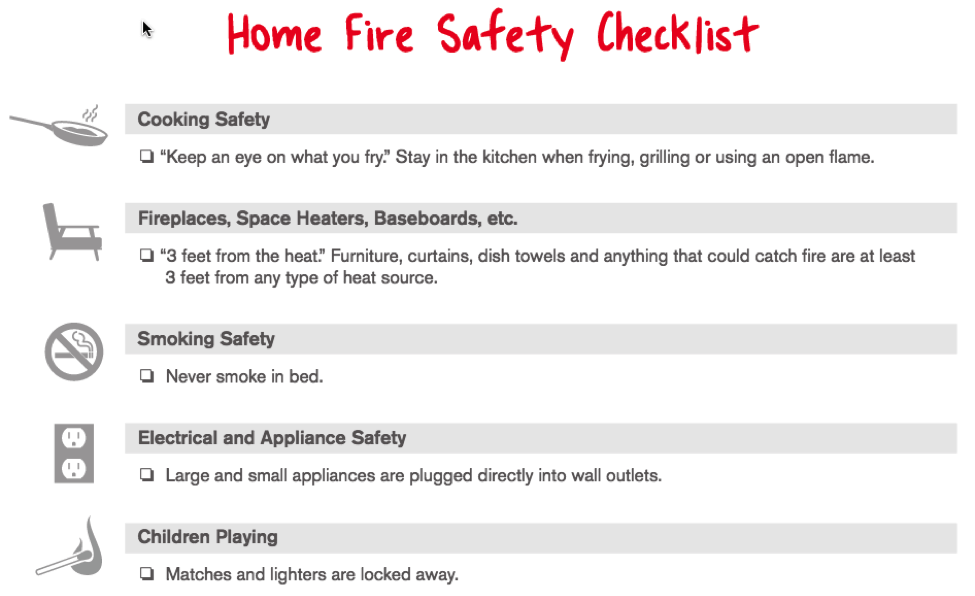
The American Red Cross raised awareness by using this checklist. Image source: Outbrain
10. Apps & Tools Lists
Marketers and business owners are always looking for the best tools to improve their marketing strategies. A well-curated list of recommended apps and tools positions your agency as an industry expert while driving organic traffic and even affiliate revenue.
To build a tools list:
- Pick a Relevant Topic: AI is hot in 2025, so you could create a list of “Best AI Lead Generation Tools for Marketers.”
- Categorize the Tools: Break them down into free vs. paid or beginner vs. advanced.
- Give Honest Insights: Don’t just describe each tool. Highlight key features and include their pros and cons.
- Monetize It: Add affiliate links where possible for extra revenue!
If you’re a content marketing agency, you could publish “Top 10 AI Writing Tools for Content Creators” and feature BrandWell, ChatGPT, Grammarly, and other AI-powered writing assistants.
Listicles often rank well on Google and bring in consistent traffic over time.
For more examples of this type of content, read our blog posts on the Top 25 Lead Generation Tools for Agency Success and 10 Best Content Marketing Analytics Tools of 2025.
If you want your digital marketing agency to stand out, you need to go beyond basic content and start creating engaging, value-driven formats that keep your audience coming back for more.
No matter which format you choose, your content should provide value to your audience and offer solutions to their problems.
The Importance of Regularly Updated, Quality Content
Regularly updated content helps digital marketing agencies stay relevant, maintain strong SEO rankings, and keep their audience engaged.
Yet, many agencies struggle to keep up with content demands.
The solution? A smart, strategic approach that focuses on content quality and freshness for maximum impact.
Why is it important to regularly update your content?
🚀 Boosts SEO & Improves Search Rankings
Search engines prioritize fresh, valuable content. Google’s algorithm considers factors like recency, relevance, and engagement when ranking pages. If your website is static and outdated, it risks being outranked by competitors who are consistently publishing and updating their content.
What to do:
- Update Old Blog Posts: Refresh statistics, add new insights, and optimize keywords.
- Improve Internal Linking: Link new content to older, high-performing posts to improve site structure.
- Use Google Search Console: Identify declining pages and update them with fresh content.
For example: If you wrote a blog post in 2022 titled “Best Instagram Growth Strategies,” update it for 2025 by adding new algorithm changes, fresh case studies, and the latest Instagram features like Threads or AI-driven content recommendations.
📈 Keeps Your Audience Engaged & Builds Trust
Your audience expects up-to-date, relevant content. If they visit your blog or social media pages and see outdated advice, that’s a quick red flag. Consistently delivering fresh content keeps your brand top-of-mind and builds trust over time.
What to do:
- Create a Content Calendar: Plan updates alongside new content creation to stay consistent.
- Monitor Engagement Metrics: Track which topics your audience interacts with the most and expand on them.
- Engage with Comments & Feedback: Use audience questions as inspiration for new content.
For example: If you previously wrote a guide about “Facebook Ads in 2023,” you should revisit that content to address new ad formats, bidding strategies, and audience targeting updates.
🎯 Stay Competitive & Position Your Agency as an Authority
The digital marketing industry moves fast — if your content doesn’t keep up, you risk falling behind. Agencies that consistently publish fresh, valuable insights position themselves as thought leaders and attract more inbound leads.
What to do:
- Stay Ahead of Industry Trends: Follow top marketing blogs, attend webinars, and listen to podcasts.
- Publish Timely & Evergreen Content: Balance trend-based content with timeless, foundational topics.
- Update Service Pages & Case Studies: Ensure your website reflects your latest expertise and client successes.
For example: If AI-driven web analytics tools are trending, create a blog post about “The Best AI Web Analytics Tools in 2025” to stay ahead of the competition and attract organic search traffic.
🔄 Repurposing Content Maximizes Effort & Reach
Creating fresh content from scratch takes time and resources. Instead of constantly producing new material, repurpose existing content into different formats to extend its lifespan and reach different audience segments.
What to do:
- Turn Blog Posts into Infographics & Carousels: Summarize key points visually for LinkedIn or Instagram.
- Convert Webinars into YouTube Videos or Podcasts: Extract audio or create shorter clips.
- Use Old Articles for Email Newsletters: Revise and send as a digest to your subscribers.
- Transform Data Reports into Case Studies: Highlight key insights in a storytelling format.
For example: You can repurpose your long-form SEO guide into:
- A LinkedIn carousel summarizing key tips
- A 5-minute YouTube video explaining top strategies
- A Twitter thread breaking it down into bite-sized insights
- A podcast episode featuring an SEO expert interview
You can also do it in reverse — use BrandWell to turn your high-performing multimedia content into long-form blog posts!
BrandWell lets you generate articles in six ways:
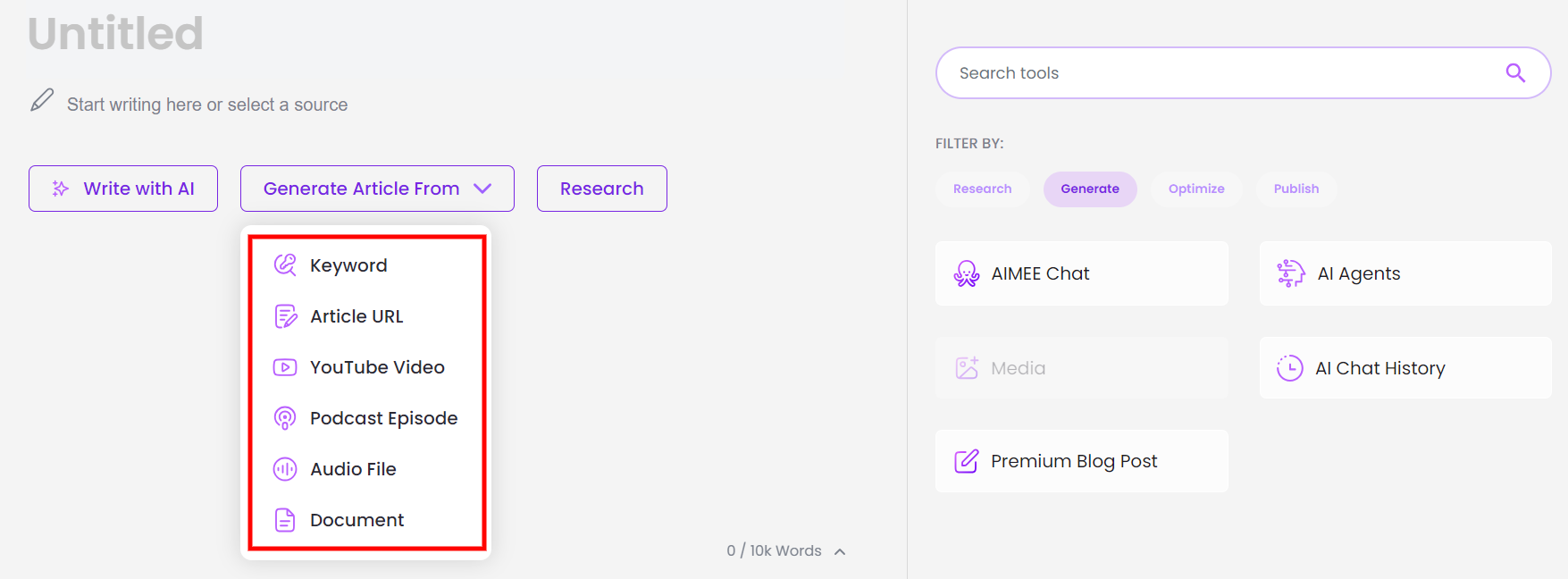
By repurposing content, you maximize content mileage while reaching audiences on different platforms.
By implementing these strategies, your digital marketing agency can create a sustainable, high-impact content engine that drives growth and engagement — without burning out your team.
Are you regularly updating your content? If not, now’s the time to start! 🚀
4 Things Every Digital Marketing Agency Needs
In the rush to develop top-notch content for their clients, content marketing agencies often overlook their own branding. It’s a common irony: agencies become so absorbed in client projects that their own marketing efforts get sidelined.
To prevent your competitors from gaining an edge, your digital marketing agency should have:
1. A Unique Value Proposition
Content marketing agencies are practically a dime a dozen these days. In the digital age, standing out from the crowd is essential, especially in a saturated market.
Every agency needs to “niche down” and demonstrate what makes them unique. Casting too wide of a net makes companies forgettable rather than memorable.
Think of your unique value proposition (UVP) as your elevator pitch. It’s a concise and compelling statement that explains what you offer, to whom, and how you’re different.
Your UVP should answer the question: “Why should I choose you over everyone else?”
2. A Content Marketing Strategy
A content marketing strategy is the backbone of any successful digital marketing campaign. Without a documented strategy to guide your content creation, your content is likely to be haphazard and ineffective. A well-defined strategy ensures that all your content is working towards your business goals.
But creating a content marketing strategy is more than just choosing keywords and hitting “publish.” It requires a deep understanding of your target audience, a well-defined brand voice, and a commitment to creating high-quality content that provides value to your readers. It also means promoting your content and analyzing the results to see what’s working and what’s not.
Here are a few key elements of a successful content marketing strategy:
- Define your target audience: Who are you trying to reach with your content? What are their pain points? What kind of content are they looking for?
- Set SMART goals: What do you want to achieve with your content marketing efforts? Make sure your goals are specific, measurable, attainable, relevant, and time-bound.
- Choose the right content formats: Blog posts, infographics, videos, and social media updates are just a few examples of content formats you can use. Experiment to see what works best for your target audience.
- Create a content calendar: This will help you stay organized and ensure that you are publishing content consistently.
- Promote your content: Don’t just hit “publish” and hope for the best. Make sure you are promoting your content on social media, email, and other channels.
- Track your results: Use analytics to track your progress and see what’s working. Adjust your strategy as needed.
3. Proof of Expertise
You know your digital marketing agency is the best, but how do you prove it to potential clients? A robust portfolio showcasing successful campaigns is a strong start.
Remember, actions speak louder than words. Include specific and measurable results in your portfolio and case studies.
For example:
- Increased website traffic by X% for Client A
- Generated X leads in Y months for Client B
- Achieved an average click-through rate of Z% for Client C
These quantifiable achievements offer potential clients concrete evidence of your capabilities.
To demonstrate your expertise, consider highlighting:
- Industry Recognition: Have you won awards or been featured in reputable publications? Don’t be shy – shout it from the rooftops!
- Client Testimonials: Let your satisfied clients do the talking for you. Genuine testimonials build trust and credibility.
- Thought Leadership: Share your expertise by creating valuable content like blog posts, ebooks, or webinars. This positions your agency as a leader in the industry.
4. Versatility
Today’s digital marketing landscape is anything but static. With new platforms and strategies emerging constantly, businesses need a digital marketing agency that can adapt to the ever-changing environment.
A versatile digital marketing agency isn’t afraid to step outside of a single area of expertise. While your agency might specialize in search engine optimization (SEO), for instance, you can also offer other digital marketing services such as:
- Social Media Marketing
- Pay-Per-Click (PPC) Advertising
- Content Marketing
- Email Marketing
This breadth of services allows you to create integrated digital marketing strategies that leverage multiple channels for maximum impact. Instead of viewing each service in isolation, understand how each element can work together to achieve your business goals.
FAQs: Content for Digital Marketing Agency
What content should a digital marketing agency post?
A digital marketing agency should aim to create a varied array of content types that always keep SEO in mind. Content should speak to their target audience and showcase their knowledge, skills, and achievements.
Popular and successful examples of content used by digital agencies include informative blog posts, detailed case studies that show the success achieved in previous campaigns, how-to videos, and engaging posts on social media platforms to keep users interested while directing traffic to their landing page.
What is content in digital marketing?
In the digital marketing landscape, content is the information brands deliver to their target audiences through multiple digital mediums such as social media posts, videos, and podcasts. The ultimate goal for content marketers is to capture leads while providing value to their audiences.
Do digital marketing agencies create content?
While some larger firms often have in-house teams to curate content, a great deal of smaller agencies outsource content creation services due to limited budgets or limited experience in a particular area. One way startups can compete with the bigger players is to use an AI SEO writer like RankWell. This way they can scale their content marketing efforts without the need for an army of human writers.
What should a digital marketing agency offer?
When taking on clients, digital marketing agencies need to clearly understand what their clients need. They can help companies grow by using their expert knowledge of content marketing, search engine optimization, Google Ads/PPC, email marketing, or social media marketing.
Conclusion
Crafting top-tier content isn’t just about flashy words or eye-catching visuals — it’s about understanding your audience, staying ahead of trends, and continually refining your strategy.
Remember, your content is a reflection of your brand, and it’s what sets you apart in a crowded marketplace. So, take the time to create content that resonates, engages, and converts.

